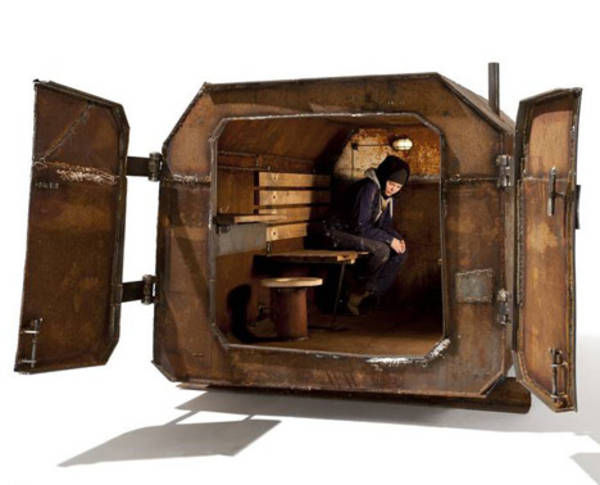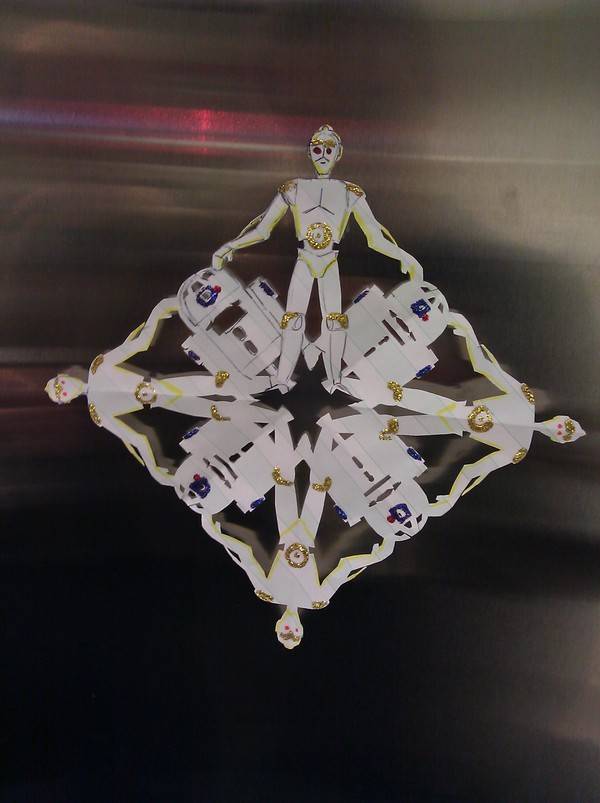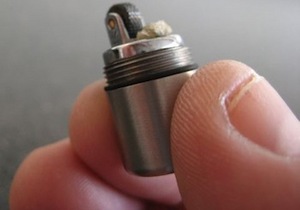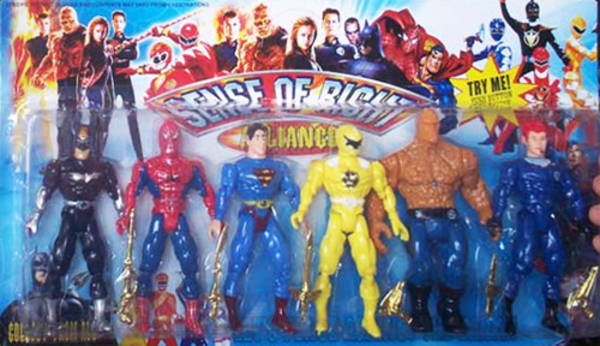The Latest from Boing Boing |  |
- Wonderful news from the OpenVizsla project
- Portland: home of the dream of the 90s
- Why you shouldn't deep-fry a gnocchi
- Car immobilizers cracked due to crappy proprietary crypto
- Commodore 64 reborn as a high-spec PC
- Isle of Sound: a sequencer powered by little cars
- Rusty armored survivalist cabin
- Old ad for hotel furniture
- Lovely Star Wars posters
- If Winsor McKay drew the origin-stories of Superman's arch-enemies
- DIY cardboard tube-radio kit
- Star Wars droidflake
- Hand-powered table-saw is a high tech marvel
- Captain Beefheart, RIP
- Details of rape, sexual assault allegations against Wikileaks' Assange leaked to Guardian
- IRS agent accused of stealing refunds, mis-using IRS computer network to pilfer funds
- Through the looking glass (Boing Boing Flickr Pool)
- Wikileaks/Cablegate: Cuba banned Michael Moore's "Sicko" for fear of public backlash
- Story of evolution of life on earth, as told through fingers
- Word Lens: Augmented reality language translation app for iPhone
- Split Pea Lighter
- Popcorn in slow motion
- You Betcha: Speculation, space, and markets for alien life
- NYT magazine feature on Tor
- "Is long-term solitary confinement torture?"
- Discount store nightmare: the Sense of Right Alliance
- Frost branch (Boing Boing Flickr Pool)
- TSA misses enormous, loaded .40 calibre handgun in carry-on bag
- Parrot sings "Let The Bodies Hit The Floor" (video)
- Brazilian TV clown elected to high office, passes literacy test
| Wonderful news from the OpenVizsla project Posted: 18 Dec 2010 03:56 AM PST Last month, I blogged about OpenVizsla, a Kickstarter project aimed at raising funds to create an open, hackable USB protocol sniffer (a great boon to reverse engineers trying to write libraries for proprietary music players, cameras, game peripherals, etc). Now, Pytey, one of the project's founders, writes: A quick update on bushing and pytey's OpenVizsla open-source USB sniffer and all-around hack gadget project. We have raised a whopping 313% of our initial target ($54,813) and we have shown a sneak peek of the board design here. We have 4 days left of the Kickstarter project, so if you want to get in on the action do it SOON! PPytey tells me that Boing Boing readers have been especially generous -- thank you all! OpenViszla (Thanks, pytey!) |
| Portland: home of the dream of the 90s Posted: 18 Dec 2010 03:20 AM PST "The Dream of the 90s is Alive in Portland" -- a hymn to one of America's greatest towns, where zines, slacking, good coffee, social consciousness, public transit and all the other sweet fantasies of the 90s are still alive. (Thanks, Fipi Lele!)
|
| Why you shouldn't deep-fry a gnocchi Posted: 18 Dec 2010 03:17 AM PST Ever wonder what happens if you put gnocchi in a deep-fat frier? Steve from WebRestaurantStore discovered, the hard way, that they burst, flinging themselves high in the air in a shower of white-hot, hilarious grease. Fried Gnocchi (via Making Light)
|
| Car immobilizers cracked due to crappy proprietary crypto Posted: 18 Dec 2010 03:13 AM PST Karsten Nohl of Security Research Labs, a white-hat hacker, believes that a recent spike in car theft is due to a break in the car immobilizer security systems; thieves are able to re-mobilize the immobilized vehicles. My question is: how long until someone builds a TV-B-Gone for car engines that lets you stop cars with the click of a button? Criminals find the key to car immobilisers (via Schneier) (Image: Invalidka - Soviet car for disabled people, a Creative Commons Attribution (2.0) image from dittaeva's photostream) |
| Commodore 64 reborn as a high-spec PC Posted: 18 Dec 2010 03:05 AM PST  Whomever currently owns the much-passed-around "Commodore USA" corporate trademarks is shipping a modern Commodore 64 clone ("It's back... and better than ever! The new Commodore 64 is a modern functional PC as close to the original in design as humanly possible. It houses a modern mini-ITX PC motherboard featuring a Dual Core 525 Atom processor and the latest Nvidia Ion2 graphics chipset. It comes in the original taupe brown/beige color, with other colors to follow."). Pretty high-spec for a C64! They're doing more colors soon, It looks like they're also planning a bunch of other retro-PCs: some Amigas, a Phoenix, and some alternate-universe high-end Commodore products from a timeline in which the original company didn't go belly up. Commodore USA (via Oh Gizmo)
|
| Isle of Sound: a sequencer powered by little cars Posted: 18 Dec 2010 02:59 AM PST  Isle of Tune is a graphic musical sequencer; you build little "Islands" consisting of roadways lined with houses, trees and other terrain, then you set virtual cars running around the roads; each terrain item they pass makes a different sound. The island pictured here is the number one on the leaderboard at present; it plays an obscure pop song called "Beat It." Isle of Tune (via Kottke)
|
| Rusty armored survivalist cabin Posted: 18 Dec 2010 02:54 AM PST  Atelier Van Lieshout's Vostok Cabin is a kind of blobby, rusty survivalist dwelling made from steel plates salvaged from old boats: "The changing climate, growing poverty, wars and more are only expanding. This movable nomadic dwelling unit provides shelter from this disconcerting situation." Vostok Cabin by Atelier Van Lieshout (via Neatorama) |
| Posted: 18 Dec 2010 02:51 AM PST  The ad for Simmons's Innmaster I line of hotel furniture manages to make fake Danish modern hotel rooms look glam and cool and James Bond-y. I wish everything I owned was made of "stain-defying Parkwood laminate." It'd sure make laundry-day simpler. |
| Posted: 18 Dec 2010 02:48 AM PST  Olly Moss produced these handsome, authorized Star Wars posters with Mondo Tees; they go on sale on Monday. Star Wars (via Super Punch) |
| If Winsor McKay drew the origin-stories of Superman's arch-enemies Posted: 18 Dec 2010 02:45 AM PST  Stuart Immonen illustrated the origin stories of the great DC supervillains in the style of Winsor McCay, of Little Nemo in Slumberland fame. These originally appeared in a 1998 Secret Files comic. The result is magic. |
| Posted: 18 Dec 2010 02:37 AM PST Franzis's cardboard DIY tube-radio looks like a hell of a fun way to spend a snowy holiday weekend; EUR50, including "nostalgic high frequency-tubes" and machine-translated instructions in charming pseudoenglish. FRANZIS-TUBES RADIO FOR SELF CONSTRUCTION (via Make) |
| Posted: 18 Dec 2010 02:29 AM PST  Matt sez, "One of our web developers here at The Nerdery made this awesome R2-D2 and C-3PO paper snowflake." Awesome: we've been cutting snowflakes and paper dollies here with my daughter to everyone's great delight. It's incredibly satisfying work. If I could make one of these droidflakes, I would be the greatest father ever. R2-D2 and C-3PO Paper Snowflake (Thanks, Matt!) |
| Hand-powered table-saw is a high tech marvel Posted: 18 Dec 2010 02:26 AM PST Gmoke sez, "Bridge City Tools makes a remarkable hand-powered, non-electric table saw. It is extremely versatile and precise. The video is real carpentry porn. Beautiful tool doing beautiful work." Hell yeah. Jointmaker Pro Saw - High Res - Bridge City Tool Works (Thanks, Gmoke, via Submitterator!)
|
| Posted: 17 Dec 2010 07:58 PM PST |
| Details of rape, sexual assault allegations against Wikileaks' Assange leaked to Guardian Posted: 17 Dec 2010 05:46 PM PST  (Photo: WikiLeaks founder Julian Assange speaks to the media outside Ellingham Hall in Norfolk England, earlier today. REUTERS/Paul Hackett) The Guardian has published the full sex crime allegations against Julian Assange, breathlessly titled "10 days in Sweden." The previously unpublished police documents provide "the first complete account of the allegations against the WikiLeaks founder," and include the phrase "the worst sex ever." Assange has not yet been charged with any crime. Also notable, this quote from Wikileaks' coordinator in Stockholm, who knows both Assange and the two women involved: "This is a normal police investigation. Let the police find out what actually happened. Of course, the enemies of WikiLeaks may try to use this, but it begins with the two women and Julian. It is not the CIA sending a woman in a short skirt." |
| IRS agent accused of stealing refunds, mis-using IRS computer network to pilfer funds Posted: 17 Dec 2010 05:02 PM PST Oh, this is rich: an Internal Revenue service agent is accused of stealing taxpayers' refunds, and entering "fake tax refund requests and transfers in an IRS computer system so the money would go right back to her or relatives and friends." |
| Through the looking glass (Boing Boing Flickr Pool) Posted: 17 Dec 2010 04:57 PM PST  "Ground Control to Major Sean (take your protein pills and put your helmet on)," a photograph contributed to the Boing Boing Flickr Pool by BB reader John K. Goodman, whose website is here. |
| Wikileaks/Cablegate: Cuba banned Michael Moore's "Sicko" for fear of public backlash Posted: 17 Dec 2010 04:28 PM PST US diplomatic cables released by Wikileaks show that the government of Cuba banned Michael Moore's 2007 documentary, Sicko, "because it painted such a 'mythically' favourable picture of Cuba's healthcare system that the authorities feared it could lead to a 'popular backlash', according to US diplomats in Havana." What, those gleaming hospitals aren't available to everyone in Cuba? And you can't believe everything you see in a Michael Moore movie? Say it ain't so! Snip:
WikiLeaks: Cuba banned Sicko for depicting 'mythical' healthcare system (Guardian, via Michael Moynihan) |
| Story of evolution of life on earth, as told through fingers Posted: 17 Dec 2010 04:20 PM PST "The abridged story of life on earth, as told through the medium of walking fingers." SHORT stories - Walks of Life - Cyriak (youtube.com, thanks Mark Day!) |
| Word Lens: Augmented reality language translation app for iPhone Posted: 17 Dec 2010 04:59 PM PST  Sweet fancy wookiees, y'all, this new iPhone app sure is making the blog and tweet rounds today. The idea behind Word Lens is this: point your iPhone's camera lens at text out there in the world (a restaurant menu, a street sign), and the app translates that text instantly. The promise is a form of augmented reality assistance that breaks down language barriers. As with many Cool New Things, this initial launch is pretty useless in real-world, practical terms, but is wicked cool and a lot of fun. I would not rely on this app to accurately translate important signs on my next trip to a foreign nation—"Do not touch nuclear waste!," for instance. The free demo version allows you to do stuff like flip viewed text backwards. English-to-Spanish and Spanish-to-English translation engines will set you back $5 each. And boy do they suck! Like everything important, I tested it out on LOLcats. The image in this post is Word Lens wrestling with "What is this I don't even." Indeed!
But what matters to me is the significant first step this represents. Early voice recognition and text-to-speech software were klunky too. And remember the early days of Babelfish, or the even crappier translation programs that preceded it? All grew more refined as new iterations come to pass. This is magic. And magic needs time to evolve.
Word Lens in the iTunes App Store. Around the web: Washington Post, New York Times, Ars Technica, LA Times, CNET.
|
| Posted: 17 Dec 2010 03:01 PM PST  My Cool Tool gift this year is the "Split Pea" Lighter from County Comm. It's the "world's smallest lighter," a stainless steel tube 1.3" high and 0.5" in diameter. Unscrew the top, flick the flint wheel, and behold! Fire! Now I don't smoke, and rarely do I need to start fires here in Brooklyn. But the Split Pea appeals to my inner gearhead. It's ridiculously small, well machined, and functions well. It's sealed so that you can carry it in your bag, Every Day Carry kit, purse, etc. without worrying about fuel spills or spontaneous combustion. Plus, you never know when you might need fire, right? My Cool Tool gift this year is the "Split Pea" Lighter from County Comm. It's the "world's smallest lighter," a stainless steel tube 1.3" high and 0.5" in diameter. Unscrew the top, flick the flint wheel, and behold! Fire! Now I don't smoke, and rarely do I need to start fires here in Brooklyn. But the Split Pea appeals to my inner gearhead. It's ridiculously small, well machined, and functions well. It's sealed so that you can carry it in your bag, Every Day Carry kit, purse, etc. without worrying about fuel spills or spontaneous combustion. Plus, you never know when you might need fire, right?  I've carried a number of fire-starters in my EDC kit, and the Split Pea is the one I've settled on for durability, weight and size. I wouldn't want to light 20 cigarettes a day with it -- it's almost *too* small -- but for occasional or emergency use it's perfect. It's a great gift because it's useful, fairly cheap ($11.50), and universal in appeal. If you're giving it to someone in person, it's a good idea to fuel it up with liquid lighter fluid (from the hardware store) first, so they can try it out right away. (It's probably a bad idea to send a fueled-up lighter through the mails, although apparently you can take it with you through TSA security as a carry-on item.) Even people who don't carry lighters will like the Split Pea. -- Mike Everett-Lane Split Pea Lighter $11.50 Comment on this at Cool Tools. Or, submit a tool! I've carried a number of fire-starters in my EDC kit, and the Split Pea is the one I've settled on for durability, weight and size. I wouldn't want to light 20 cigarettes a day with it -- it's almost *too* small -- but for occasional or emergency use it's perfect. It's a great gift because it's useful, fairly cheap ($11.50), and universal in appeal. If you're giving it to someone in person, it's a good idea to fuel it up with liquid lighter fluid (from the hardware store) first, so they can try it out right away. (It's probably a bad idea to send a fueled-up lighter through the mails, although apparently you can take it with you through TSA security as a carry-on item.) Even people who don't carry lighters will like the Split Pea. -- Mike Everett-Lane Split Pea Lighter $11.50 Comment on this at Cool Tools. Or, submit a tool! |
| Posted: 17 Dec 2010 12:40 PM PST Much like setting stuff on fire, filming things in slow motion is one of those science video tropes that has less to do with science, and more to do with making vaguely science-related things look really cool. And yet, you know, it does look really cool. Take this video, for instance. "How popcorn works" is not exactly news to most people over the age of 5. But damned if I'm not completely engrossed by the sight of hot kernels turning themselves inside out, anyway. Thanks to Ms. Paige Worthy! Naturally, all this popcorn talk makes me think of exactly one thing—Farmer Boy. Seriously, if you only ever read Little House in the Big Woods and Little House on the Prairie, do yourself a favor and seek out this third installment, which is basically a 384-page paean to all the food Laura Ingalls never got to eat as a child, occasionally broken up with a bit of narrative about her eventual husband's formative years as the son of wealthy horse farmer. The Little House books are pretty food-porn heavy to begin with, but it's laid on thickest in Farmer Boy. I love that book. Even if popcorn and milk aren't as awesome together as Almanzo Wilder thinks. |
| You Betcha: Speculation, space, and markets for alien life Posted: 17 Dec 2010 12:31 PM PST  (photo by Katrina Tuliao, via Wikipedia) This morning, on the web site of Science magazine, the news and research journal of the American Association for the Advancement of Science, the title and summary of an article came up that was so intriguing that I had to quickly log in to my computer at work, get behind the pay wall, and read to find out the news. I mean, who would not want to know the details of how "Alien Planets Hit the Commodities Market"? Having been behind the pay wall, I am here to inform you that it is a perfectly pleasant article about the continued discovery of planets around other stars. But the commodities part just came from a clever headline writer. DAMNIT! I was really hoping that the article was going to be about someone setting up a commodities market where you could buy shares in the date of when we first make alien contact, much like how in "election stock markets" you can buy shares in your prediction for who is going to win presidential elections. It has been shown repeatedly that these election stock markets are excellent predictors of who will win the race. Markets are quite amazing things. I once heard a talk by an economist about a computer manufacturer trying to predict next month's price of computers and printers. Several people in the company were supposed to be experts at these predictions, but they rarely got the right answer. The experiment that the economist ran involved letting everyone at the company who had any sort of knowledge about any part of the process participate in a predictive market, where they could buy "shares" in a certain price point, or essentially bet on what the price next month was going to be. If they were wrong, all of the shares that they bought were worthless, but if they were right they could win big. This was simple betting, but with a twist. The market price of the "shares" somehow reflected all of individual thoughts and hopes and speculations of what the price would be. No one thought that a computer was going to cost twenty dollars, so you could buy shares of "twenty dollars" for next to nothing. Of course, they were pretty much guaranteed to be worth absolutely nothing, which is less than next to nothing, so you would lose money. As you got closer to the price that most people thought the computers were going to be next month the cost of the shares rose. All of this experimentation could be considered an interesting exercise except for one astounding point: the economists found that the market was better at forecasting the future price than the "experts" were. Somehow all of the individuals were able to exchange and synthesize information simply by buying and selling shares of prices and all of this information exchange led to better predictions than anyone else was able to make. As I sat and listened to this that evening I was shocked and astounded and excited. Scientists had always thought they had a monopoly on the best way to predict things ("the scientific method") and yet here was a totally non-scientific method that seemed to lead to truth in a pretty clear way. It was a strange truth: not one proved with postulates and experiments, but one simply deemed the most likely. Before getting too carried away with these ideas, though, I also learned at that lecture that markets aren't perfect predictors and that the economists could run similar experiments where, with a few simple tweaks, they could make market bubbles and other odd effects. This fact would come as no surprise to anyone who has been alive for any of the past few years. Thinking about markets for alien life led me to thinking, in general, about science and markets. OK, so perhaps this market approach couldn't lead to truth in quite the way that the scientific method could, but maybe there was still a place for it. What about scientific markets for things that can't quite be proven beyond sufficient doubt but that most scientists would be willing to bet a lot on. The first thing that comes to mind is climate change. To most earth scientists, the only arguments about climate change are precisely how strong an affect it will be in different places. But somehow, because of the complexities of the questions, the public frequently sees the disagreement over the uncertainties rather than the fundamental agreements. Clearly, this was a place where a market could work. What about betting on the magnitude of climate change? Buying shares of the average temperature rise by 2050? You can argue all you want that the average temperature in 2050 will be the same as now. And then I can collect your money. (Unless I am wrong, in which case you can collect mine. Just do me a favor and show your certainty by betting A LOT of money.) While this is all fun speculation, I fear that people would be confused by scientists buying shares in a future temperature market (anyone else remember the quickly canceled DARPA experiment to have people buy shares in predicting terrorist actions?). But what about just using the ideas amongst scientists? If I could get all of the astronomers around to buy into a market on whether or not planets with earthlike climates would ever been found around other stars, for example, I would have an effective way of collecting all of the disparate information that everyone had and coming up with the best prediction based on all of the data. I have a better idea, though, I think. Scientists could engage in what amounts to insider trading in markets! If I really believe, for example, that the climate is warming, and that, for the most part, the rest of the world is not dealing rationally with that fact, I should buy land somewhere in central Canada where it is right now too cold for most people and then I should reap the incredible returns when the land prices skyrocket because people can no longer live in Los Angeles anymore (as crazy as this sounds, I know one scientists who independently came to the same conclusion and bought himself some [currently] chilly property in Minnesota). I will admit that every once in a while I look at shorelines and ponder which properties are going to be future ocean view properties. A market does exist for climate change speculation, only it is a bit more indirect than simply betting on temperatures. As a mere professor, I don't have the financial means to follow up on my early morning speculations about speculation. I leave that to you. If you are thoroughly convinced that the sea level is going to stay the same, you might consider getting some property now on the Tuvalu Islands. If you believe that the Northwest Passage is going to be continuously navigable from now on out, you might consider investing in much needed port infrastructure. No need to argue. Just place your bets, take your chances, and wait for the money to roll in. |
| Posted: 17 Dec 2010 12:18 PM PST Good heavens! A New York Times magazine feature on Tor, the "onion routing system" that enables users to communicate anonymously on the Internet. What took 'em so long, and why now? Ah, of course: WikiLeaks is based on Tor. |
| "Is long-term solitary confinement torture?" Posted: 17 Dec 2010 12:14 PM PST  (Photograph contributed to the BB Flickr Pool by Alexandra Jones) Wikileaks founder Julian Assange was released from a London prison this week, after spending ten days without his freedom over allegations of sex crimes. The presumed Wikileaks leaker believed to be responsible for the organization's most damning disclosures, Bradley Manning, has spent many months in military detention. He remains in a Marine brig in Quantico, Virginia. His case has not yet gone to military tribunal, and he has not yet been convicted of a crime. But we now know that for most of his months in detention, both in Virginia and in the military facility in Iraq, Manning has been held in solitary confinement. Now seems like a good time to revisit the question of whether solitary confinement constitutes a form of torture, as Glenn Greenwald wrote in his piece earlier this week on Manning's brig conditions. To that point, here's a New Yorker piece from 2009, which focused on whether holding "enemy combatants" from the "war on terror" in long-duration solitary is morally justifiable. It's worth a re-read today with Manning (and an untold number of civilians in the US prison system) in mind: "It's an awful thing, solitary," John McCain wrote of his five and a half years as a prisoner of war in Vietnam--more than two years of it spent in isolation in a fifteen-by-fifteen-foot cell, unable to communicate with other P.O.W.s except by tap code, secreted notes, or by speaking into an enamel cup pressed against the wall. "It crushes your spirit and weakens your resistance more effectively than any other form of mistreatment." And this comes from a man who was beaten regularly; denied adequate medical treatment for two broken arms, a broken leg, and chronic dysentery; and tortured to the point of having an arm broken again. A U.S. military study of almost a hundred and fifty naval aviators returned from imprisonment in Vietnam, many of whom were treated even worse than McCain, reported that they found social isolation to be as torturous and agonizing as any physical abuse they suffered.Annals of Human Rights: Hellhole, by Atul Gawand (newyorker.com) (via Alexei Mostrous) |
| Discount store nightmare: the Sense of Right Alliance Posted: 17 Dec 2010 12:00 PM PST  "Apparently, a robot-armed Batman, Spider-Man, Superman, the yellow Power Ranger, The Thing, and a redheaded Reed Richards and have teamed up..." Sense of Right Alliance (Thanks, Jeff, via Submitterator!) |
| Frost branch (Boing Boing Flickr Pool) Posted: 17 Dec 2010 11:52 AM PST  A photograph contributed to the Boing Boing Flickr pool by BB reader John @ Digitalpict Photography, who lives in Scotland. |
| TSA misses enormous, loaded .40 calibre handgun in carry-on bag Posted: 17 Dec 2010 11:54 AM PST A man who flew out of Houston's George Bush airport discovered a loaded handgun in his carry-on bag after landing; he'd forgotten he was carrying it and the eagle-eyed TSA screeners were too busy ogling his penis to spot the loaded gun in the nearly empty bag from which he'd dutifully removed his laptop. "I mean, this is not a small gun," Seif said. "It's a .40 caliber gun."Man boards plane at IAH with loaded gun in carry-on (via Consumerist)
|
| Parrot sings "Let The Bodies Hit The Floor" (video) Posted: 17 Dec 2010 11:09 AM PST You're welcome. Also, I'm sorry. [video link] |
| Brazilian TV clown elected to high office, passes literacy test Posted: 17 Dec 2010 11:07 AM PST Brazilian TV clown Francisco Oliveira (AKA Tiririca) has been elected to the Brazilian government, running on such slogans as "What does a federal deputy do? I have no idea -- but vote for me and I'll let you know." He was required to take a literacy test (which he narrowly passed) before taking office. Brazil clown secures congress seat after literacy test (via JWZ) |
| You are subscribed to email updates from Boing Boing To stop receiving these emails, you may unsubscribe now. | Email delivery powered by Google |
| Google Inc., 20 West Kinzie, Chicago IL USA 60610 | |

 Juels says that these cracks were possible because the proprietary algorithms that the firms use to encode the cryptographic keys shared between the immobiliser and receiver, and receiver and engine do not match the security offered by openly published versions such as the Advanced Encryption Standard (AES) adopted by the US government to encrypt classified information. Furthermore, in both cases the encryption key was way too short, says Nohl. Most cars still use either a 40 or 48-bit key, but the 128-bit AES - which would take too long to crack for car thieves to bother trying - is now considered by security professionals to be a minimum standard. It is used by only a handful of car-makers...
Juels says that these cracks were possible because the proprietary algorithms that the firms use to encode the cryptographic keys shared between the immobiliser and receiver, and receiver and engine do not match the security offered by openly published versions such as the Advanced Encryption Standard (AES) adopted by the US government to encrypt classified information. Furthermore, in both cases the encryption key was way too short, says Nohl. Most cars still use either a 40 or 48-bit key, but the 128-bit AES - which would take too long to crack for car thieves to bother trying - is now considered by security professionals to be a minimum standard. It is used by only a handful of car-makers...  Make your own radio, combining the new and old technique together. The tubes works for strong reception and for the tube radios typical plesant sound. A modern Audio-IC and high class loudspeaker works for optimal volume. With this tube radio you can catch stations from all over the world. In fact you can also receive the ham-radio with this device. The tube radio has strong reception a modern world receptor. You can let yourself carried -off in the good old times, as to make your own radio normally. This packet contains all the necessary components
Make your own radio, combining the new and old technique together. The tubes works for strong reception and for the tube radios typical plesant sound. A modern Audio-IC and high class loudspeaker works for optimal volume. With this tube radio you can catch stations from all over the world. In fact you can also receive the ham-radio with this device. The tube radio has strong reception a modern world receptor. You can let yourself carried -off in the good old times, as to make your own radio normally. This packet contains all the necessary components 
 The revelation, contained in a confidential US embassy cable released by WikiLeaks , is surprising, given that the film attempted to discredit the US healthcare system by highlighting what it claimed was the excellence of the Cuban system.
The revelation, contained in a confidential US embassy cable released by WikiLeaks , is surprising, given that the film attempted to discredit the US healthcare system by highlighting what it claimed was the excellence of the Cuban system.

No comments:
Post a Comment